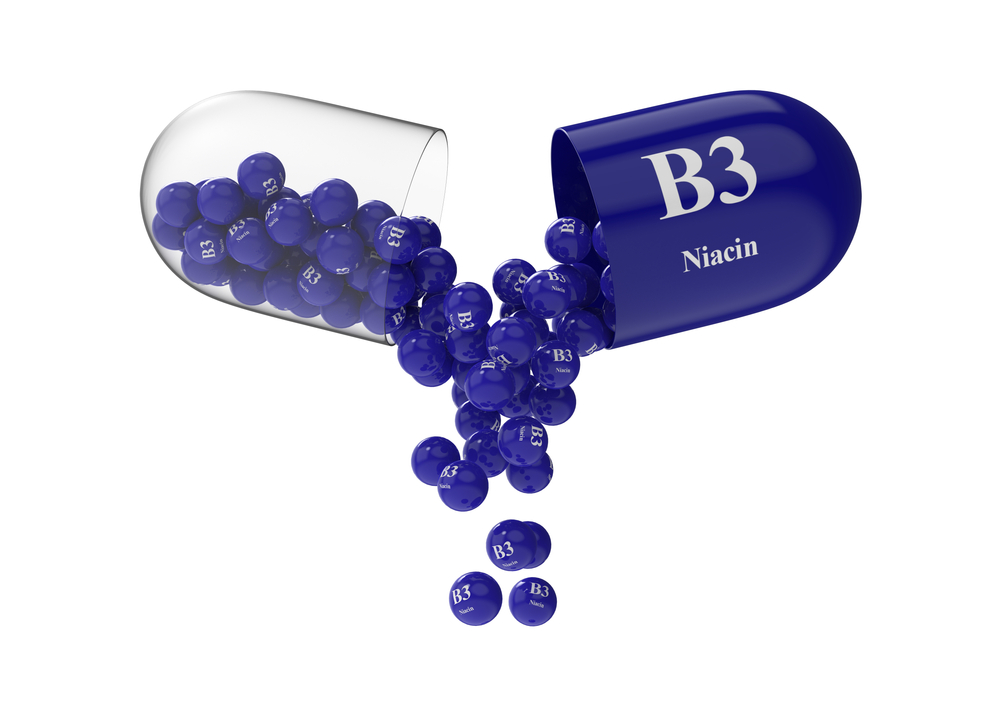
Niacin, known as vitamin B3 is essential for a wide range of functions in the body. Specifically it is important for digestion, energy production and promoting healthy skin and brain.. This vitamin also know as vitamin P needs to be taken in the diet daily as it is excreted in the urine. Although rare today, a niacin deficiency has been known to lead to Pellagra. Pellagra shows symptoms of diarrhea, behavioral aberrations, skin lesions, seizures, vomiting, balance problems and eventually death if not corrected. Many foods have been fortified with niacin to prevent Pellagra from happening.
Niacin supplementation is generally considered safe however, a common side effect involves flushing. Flushing is when you experience redness on the skin perhaps with a burning sensation or perhaps tingling. It has been suggested that if you have this problem to take aspirin before you take niacin.If necessary, lower the dose of niacin until your system gets used to it.
It is best if you avoid large doses as this can have serious repercussions such as liver dysfunction, visual loss, hyperglycemia and heart arrhythmia. If you have health issues such as hypotension, stomach ulcers, gallbladder, liver, or kidney dysfunction, or heart problems, it is best to consult with your healthcare provider before taking niacin.
Niacin or B3 is important for the production of ATP in the mitochondria. Niacin is the precursor of niacinamide which is a part of nicotinamide adenine dinucleotide (NAD). NAD is important for electron transfer in the Tricarboxylic Acid Cycle (TCA) and the Electron Transport System (ETS). These two pathways produce the most ATP in the cell. Niacin is also crucial in the conversion of fat molecules into carbohydrates. Since niacin is important for glucose metabolism it can treat individuals who are constantly tired where fatigue has become a serious issue. It has also been known to stimulate the production of hydrochloric acid in the stomach thereby increasing digestion. It is also known to help individuals handle stress better by decreasing anxiety and depression as well as benefit people who have neuralgia.
However, niacin deficiencies have been known to generate depression, sleeplessness and anxiety and when ignored can bring about serious repercussions such as schizophrenia. The mechanism for depression seems to have to do with declining levels of the feel good neurotransmitter serotonin. The precursor of serotonin is L-Tryptophan and the precursor of L-Tryptophan is niacin. Not only that, but L-Tryptophan is involved in supplying the body with niacin. One way to elevate serotonin levels is to supplement with niacin and L-Tryptophan and in turn this should help relieve depression and elevate mood. Boosting serotonin levels will also boost the production of melatonin. Melatonin is secreted by the pineal gland and is responsible for sleep. So, niacin may act as a sleep aid indirectly.
Maintaining proper levels of niacin or B3 should keep your system in balance preventing sleep problems and mood swings. B3 supplementation should keep you happy and alert. More so today, a mixture of B vitamins are taken known as B-complex. These should be taken daily. If you are someone who take in a lot of alcohol, coffee, smokes, and eats a lot of processed food, B-complex supplementation is paramount. B vitamins are destroyed by alcohol, caffeine and nicotine.
Niacin has also been reported to treat skin problems, migraine headaches, arthritis, increase libido, detox the body and improve blood flow. It is believed to work well on various neuroses and dementia however research is sparse here and somewhat contradictory.
Having adequate amounts of niacin or vitamin B3 in your system may help to keep you in a good mood, make you feel good about yourself, promote restful sleep, and provide you with plenty of energy from glucose metabolism.
